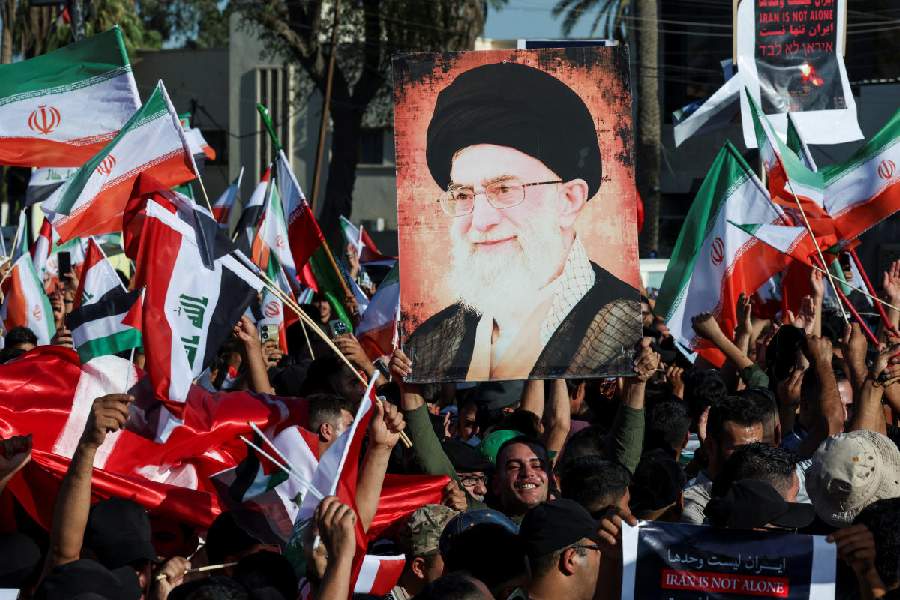Iran is in the grip of unprecedented military escalations and internal unrest, but what’s stirring even more speculation is the sudden and unexplained disappearance of Supreme Leader Ayatollah Ali Khamenei.
The 86-year-old leader, who holds the ultimate authority in the Islamic Republic, has not been seen or heard from in public for nearly a week.
His silence has ignited speculation, concern and unease both within Iran and beyond.
While Khamenei may be off the radar, it seems he’s swapped the centre stage for a keyboard and gone full digital dissident , firing off hot takes on X with Wi-Fi and pride over Iran's 'victory'.
"The Islamic Republic delivered a heavy slap to the US’s face. It attacked and inflicted damage on the Al-Udeid Air Base, which is one of the key US bases in the region," Khamenei wrote on Thursday.
"The fact that the Islamic Republic has access to key US centers in the region and can take action whenever it deems necessary is a significant matter. Such an action can be repeated in the future too. Should any aggression occur, the enemy will definitely pay a heavy price."
"My congratulations on our dear Iran’s victory over the US regime," he added. "The US regime entered the war directly because it felt that if it didn’t, the Zionist regime would be completely destroyed. It entered the war in an effort to save that regime but achieved nothing."
Continuing the aggressive tone, he further declared, "With all that commotion and all those claims, the Zionist regime was practically knocked out and crushed under the blows of the Islamic Republic."
He began one of the posts by congratulating the nation on what he called a "victory over the fallacious Zionist regime."
Khamenei's online statements come amid a fragile and controversial ceasefire, reportedly brokered by US President Donald Trump, following an escalation that saw Israeli and US forces jointly bomb three of Iran's major nuclear sites.
Iran responded with missile strikes on an American base in Qatar, in what Tehran hailed as a successful retaliation.
Yet even as the rhetoric rises online, the Iranian leader remains absent from public life.
State media has released no images or footage of him since hostilities began. Officials close to Khamenei claim he has been moved to a secret underground bunker and is refraining from electronic communication to avoid potential assassination attempts, according to Reuters.
Israeli Prime Minister Benjamin Netanyahu has reportedly not ruled out the possibility of targeting him, despite Trump's alleged advisory against such an action, according to The New York Times.
Reports suggest that even top officials within the Iranian government have been cut off from direct contact with the Supreme Leader.
On Tuesday, during a prime-time interview on Iranian state television, an anchor asked Mehdi Fazaeli, a senior official from Khamenei's office, about his condition. "People are very worried about the Supreme Leader. Can you tell us how he is?" asked the anchor. Fazaeli sidestepped the question, stating only, "We should all be praying. Those tasked with protecting the Supreme Leader were doing their job."
In Tehran over the weekend, women were seen holding portraits of Khamenei during anti-US and anti-Israel protests.
The show of support came despite the absence of any message or direct guidance from their leader.
Iranian newspapers have also begun to raise alarm. “His days-long absence has made all of us who love him very worried,” said Mohsen Khalifeh, editor of the daily Khaneman. He added, “If Khamenei were dead, his funeral would be the most glorious and historic.”
Adding to the growing uncertainty, a three-man committee from a top clerical body — appointed by Khamenei himself two years ago to identify his successor — has reportedly accelerated its deliberations, according to Reuters.
A top Iranian security official told the agency that Khamenei is now under the protection of the Vali-ye Amr special forces unit of the Islamic Revolutionary Guards and has gone into hiding with his family.
The air assault launched by Israel on June 13 dealt a heavy blow to Iran’s military leadership, killing several top commanders and nuclear scientists in what is now considered one of the most significant escalations in West Asian history.
Iran's missile retaliation succeeded in breaching Israel’s sophisticated air defence systems in significant numbers for the first time.
Iranian authorities claimed that the attacks resulted in 627 deaths and nearly 5,000 injuries within their territory. However, independent verification remains difficult due to strict restrictions on media access. In Israel, officials confirmed 28 fatalities.










